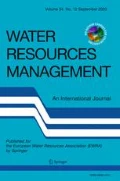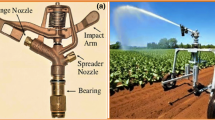Abstract
A common problem that the world faces is the waste of energy. In water pump stations, the situation is not different. Employees still use the traditional, manual, and empirical operation of the water pumps. This process gradually generates unwanted losses of energy and money. To avoid such profligacy, this paper presents two Adaptive and one Improved Multi-population based nature-inspired optimization algorithms for water pump station scheduling. The main goal here is to obtain the optimal operational scheduling of each group of pumps, wasting the minimum amount of energy. Therefore, since the objective function relies on the shaft power consumption of all the pumps running together, our aim becomes feasible. We implemented and tested the algorithms in the main water pump station of Shanghai, in China. Based on traditional multi-population based nature-inspired optimization algorithms, such as Genetic Algorithm (GA), Ant Colony Optimization (ACO), and Particle Swarm Optimization (PSO), this work adapts and improves the models to fit the complex constraints and characteristics of the system. It also compares and analyses the performance of each method used in this case study, considering the obtained results. The method which demonstrated outperformance was chosen as the best solution for the present problem.




Similar content being viewed by others
References
Bachus L, Custodio A (2003) Know and understand centrifugal pumps, pp 39–42
Dong W, Yang Q (2020) Data-driven solution for optimal pumping units scheduling of smart water conservancy. IEEE Internet of Things Journal 7(3):1919–1926
Dorigo M, Di Caro G (1999) The ant colony optimization meta-heuristic. In: Corne D, Dorigo M, Glover F (eds) New ideas in optimization. McGraw Hill, London, pp 11–32
Eberhart R, Kennedy J (1995) A new optimizer using particle swarm theory, MHS’95. In: Proceedings of the sixth international symposium on micro machine and human science, Nagoya, Japan, pp 39–43
European Commission (2012) Impact assessment. Proposal for a commission regulation implementing directive 2009/125/EC with regard to ecodesign requirements for water pumps
Hydraulic Institute and Department of Energy (US) (2006) Improving pumping system performance: a sourcebook for industry. Technical report
Kalaiselvan ASV, Subramaniam U, Shanmugam P (2016) A comprehensive review on energy efficiency enhancement initiatives in centrifugal pumping system. Appl Energy 181:495–513
Luna T, Ribau J, Figueiredo D, Alves R (2019) Improving energy efficiency in water supply systems with pump scheduling optimization. J Clean Prod, pp 342–356
Ma H, Shen S, Yu M, Yang Z, Fei M, Zhou H (2019) Multi-population techniques in nature inspired optimization algorithms: a comprehensive survey. Swarm and Evolutionary Computation 44:365–387
Surjanovic S, Bingham D (2013) Virtual Library of simulation experiments: test functions and datasets. Retrieved May 14, 2020, from http://www.sfu.ca/ssurjan
Torregrossa D, Capitanescu F (2019) Optimization models to save energy and enlarge the operational life of water pumping systems. J Clean Prod 213:89–98
Turci LDO, Sun H, Bai M, Wang J, Hu P (2019) Water pump station scheduling optimization using an improved genetic algorithm approach. In: 2019 IEEE congress on evolutionary computation (CEC), Wellington, New Zealand, pp 944–951
Zhang Z, Zeng Y, Kusiak A (2012) Minimizing pump energy in a wastewater processing plant. Energy 47(1):505
Zheng F, Zecchin AC, Newman JP, Maier HR, Dandy GC (2017) An adaptive convergence-trajectory controlled ant colony optimization algorithm with application to water distribution system design problems. In: IEEE transactions on evolutionary computation, vol 21, pp 773–791
Zhu J, Wang J, Li X (2016) Research and design of feed pump diagnosis system based on resonance-based sparse signal decomposition. In: 2016 27th Chinese process control conference (CPCC)
Funding
This work is supported by Key Projects from Ministry of Science and Technology (No. 2017ZX07207005-01), National Key R&D Program of China (No. 2017YFC0405400), National Natural Science Foundation of China (No.61533013, 61633019, 61433002), Shaanxi Provincial Key Project (2018ZDXM-GY-168) and Shanghai Project (17DZ1202704).
Author information
Authors and Affiliations
Corresponding author
Ethics declarations
Conflict of interests
The authors declare that they have no conflict of interest.
Additional information
Publisher’s Note
Springer Nature remains neutral with regard to jurisdictional claims in published maps and institutional affiliations.
Rights and permissions
About this article
Cite this article
de O. Turci, L., Wang, J. & Brahmia, I. Adaptive and Improved Multi-population Based Nature-inspired Optimization Algorithms for Water Pump Station Scheduling. Water Resour Manage 34, 2869–2885 (2020). https://doi.org/10.1007/s11269-020-02588-3
Received:
Accepted:
Published:
Issue Date:
DOI: https://doi.org/10.1007/s11269-020-02588-3




